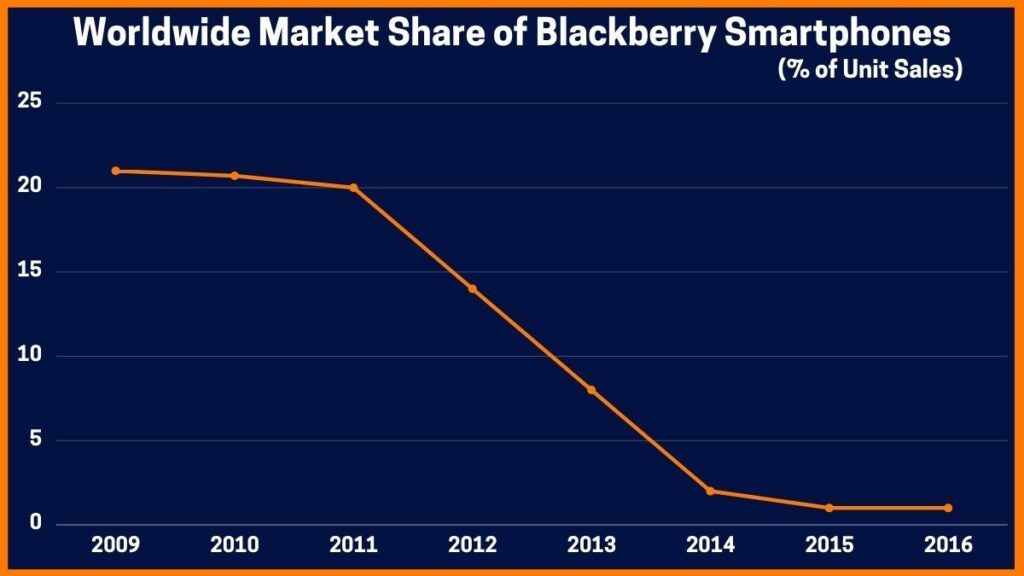BlackBerry’s demise as a dominant player in the smartphone industry is a poignant illustration of how quickly technological leaders can fade. The revolutionary devices and secure messaging systems that the company developed marked its meteoric rise, but its subsequent demise is a case study in missed opportunities, strategic missteps, and the rapid pace of technological innovation. BlackBerry’s fall, its attempts to recover, and the lessons learned from it are investigated in this case study.
Overview of the Firm:
Beginnings and Early Achievement: Mike Lazaridis and Douglas Fregin founded BlackBerry in 1984, when it was formerly known as Research In Motion (RIM). The BlackBerry 850, a device that combined email and cellular communication and revolutionized mobile communication for business users, propelled the company to prominence in 1999.
Peak Performance: By the middle of the 2000s, BlackBerry had established itself as a market leader in smartphones thanks to its robust enterprise features, physical keyboards, and secure email system. The business held a significant share of the market, particularly among professionals in business and government.
New developments in technology:
OS: BlackBerry The security and dependability of the BlackBerry operating system made it a popular choice for use in business settings. The launch of the BlackBerry Bold and BlackBerry Curve series strengthened the company’s leadership position in the market.
BBM, or BlackBerry Messenger,: BBM, which came out in 2005 and offered secure communication and instant messaging, made BlackBerry more appealing to users who valued privacy and dependability.
Factors Contributing to the Decrease:

Inability to Change in the Market:
Revolution in touch screens: A new era of touchscreen devices began with the introduction of Apple’s iPhone in 2007 and the subsequent rise of Android smartphones. In a market that is increasingly dominated by touchscreens, BlackBerry’s continued focus on physical keyboards and proprietary operating system made it less competitive.
Ecosystem of Apps: The app ecosystem of BlackBerry was behind that of iOS and Android. BlackBerry’s platform did not have many well-known apps because developers were more interested in creating them for Apple and Google’s larger user bases.
Mistakes in strategy:
Choices made by management: The leadership of BlackBerry had difficulty adapting to the rapid changes in the smartphone industry. The company’s decline was a result of its reluctance to adopt touchscreen technology and its slow response to emerging trends.
Delays in Product Development: New products that could compete with the most recent innovations from Apple and Android were delayed by BlackBerry. Attempts by the company to catch up to the competition frequently came too late or too little.
Loss of Market Share:

Reduced Sales: BlackBerry’s market share began to decline as the popularity of Android and iOS devices increased. As consumers and businesses switched to smartphones with more options and features, the company’s sales fell dramatically.
The pressure of competition: In the smartphone market, BlackBerry faced intense competition from both established players and new entrants. In a competitive and rapidly changing market, the company had difficulty distinguishing itself.
Efforts to Get Better:
Strategies for a new brand:

The BlackBerry 10 launch: BlackBerry 10—the company’s brand-new operating system—and a number of brand-new devices were introduced in 2013. BlackBerry 10 failed to attract a significant number of users or app developers despite its advanced features and improved user experience.
Licensing and Partnerships: In an effort to reenergize its business, BlackBerry looked into a variety of licensing and partnership agreements. The company sought partnerships to leverage its security and enterprise solutions expertise and licensed its software and technology to other manufacturers.
Change to services and software:
Concentrate on Enterprise Software: Software and services began to replace hardware as BlackBerry’s primary focus. Offering products like the BlackBerry Enterprise Mobility Suite and cybersecurity services, the company emphasized its strengths in security and enterprise solutions.
Acquisitions: BlackBerry purchased cybersecurity company Cylance in 2019 as one of its strategic acquisitions to expand its software portfolio. The company wanted to reclaim its position as a leader in enterprise software and security with these actions.
Effects and Takeaways:
Adaptation to Technology:

Innovation’s Importance: The decline of BlackBerry demonstrates the significance of continuously adapting to market trends and technological advancements. To remain competitive in industries that are undergoing rapid change, businesses must remain flexible and innovative.
Preferences for Users: It is essential to comprehend and respond to user preferences. BlackBerry lost market relevance as a result of its failure to embrace touchscreen technology and modern app ecosystems.
Flexibility in strategy:
Strategism and leadership: Navigating shifts in the industry requires both strategic decision-making and effective leadership. The management of BlackBerry was criticized for its inability to anticipate and respond to shifts in the market.
Diversification: Risks can be reduced by expanding revenue streams and diversifying business strategies. The potential advantages of adapting to new market opportunities are demonstrated by BlackBerry’s switch to software and services.
Trends in the Market:
Situation of competition: BlackBerry’s case demonstrates how crucial it is to comprehend and respond to competitive pressures. To stay relevant and successful, businesses need to keep an eye on market trends and competitor strategies.
Conclusion:
The demise of BlackBerry serves as a cautionary tale regarding the difficulties associated with remaining competitive in a technological landscape that is rapidly changing. Despite BlackBerry’s notable innovations and successes in the early 2000s, the company’s decline was caused by its inability to adapt to market shifts and technological advancements. BlackBerry’s experience highlights the significance of innovation, strategic adaptability, and comprehension of market dynamics for long-term success.



GIPHY App Key not set. Please check settings